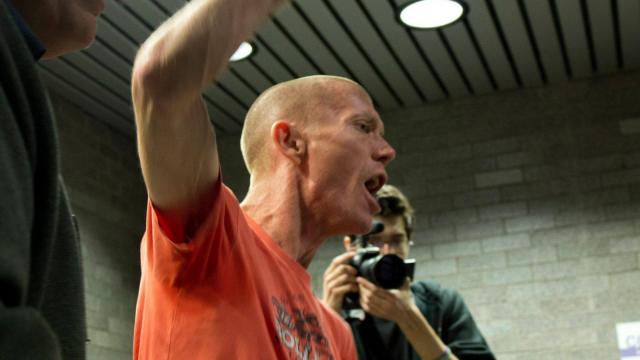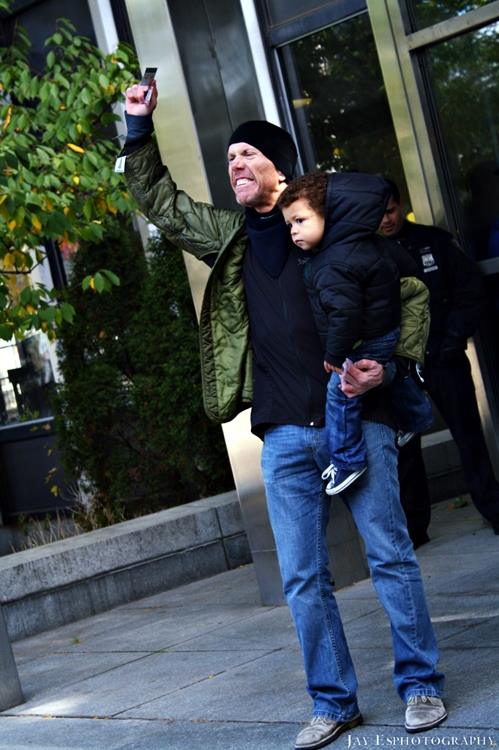
I am David Suker, the teacher and outspoken critic of the Bloomberg administration who was fired for participating in Occupy Wall Street. For the past 11 and a half years I have been a vocal advocate for public school students, for fair treatment of students of color, inner city GED students, and student fallen victim to the bureaucratic incompetence and indifference of the city's harmful public school policies.
Seeing a critical moment of opportunity for social change, I joined Occupy Wall Street from its third day, drawing high-profile attention in the media because of my arrest at the head of the Brooklyn Bridge march on Oct, 1, 2011. When I was arrested in another high-profile Occupy action, the city's Department of Education seized its chance, hastily drew up a questionable bill of particulars, and fired me.
I have already won my case against the DoE's findings. The court has ordered the DoE to reinstate me. But the DoE is appealing. Meanwhile my license remains revoked. I cannot teach. I cannot receive unemployment benefits. I cannot support my two children. I am an army veteran and a dedicated teacher. I believe in serving my country, my city, my students, my children.
—David Suker
*
At the beginning of the Occupy Wall Street Movement, when many activists were still gathered in a park in lower Manhattan, I was part of a small team that was organizing a community group in West Harlem.
It was in October of 2011 when David Suker, a local activist, teacher and veteran, initiated two meetings that brought together this group of activists who started a community-based version of Occupy Wall Street called the West Harlem 99%. The group was based on ideas similar to Occupy Wall Street like using open space to facilitate democratic discussions to create social justice. However, even though the group of us that organized the West Harlem 99% were all heavily involved in Occupy Wall Street, this group was much different—we focused largely on the needs of the community.
One of our first meetings brought together about ten activists in the basement of a small church in the middle of West Harlem. As we settled in, several uniformed police officers invaded our meeting and began to harass us. They tried to coerce individual members to leave the room and talk to them outside. Most of us refused.
We found out later that the police had contacted the priest (who was a supporter of Occupy Wall Street and the West Harlem community) before our meeting and told him we were a group of thugs and he shouldn’t let us gather in his church and he was in danger. The priest, of course could tell we were friendly and well-intentioned, so he tried to support us, but he asked us not to meet in his church because he didn’t want to be harassed by the police. As a result, we were forced to organize meetings in our apartments, cut off from the community, and our larger assemblies in a church 20 blocks away.
As an outspoken member of these groups, David, a fourteen-year tenured teacher, became a prime example of how corporate and government institutions use power to silence citizens who speak out against injustice.
A lot of people argue against teacher tenure. They say the unions protect lazy and ineffective teachers, but when teachers are not protected, how can they stand up to the system we all want to change? Most teachers want to teach. They want to help kids learn and get a good education: it excites them when their students light up with ideas and when they understand a new concept. Most importantly, teachers understand the school system from the inside. They know why it doesn’t work, but they are often afraid to speak out against it. David’s case is an example of why.
After becoming a vocal member of Occupy Wall Street and the West Harlem 99%, David was systematically attacked by the city of New York and the Department of Education (DOE).
David was arrested as part of a large group at Occupy Wall Street when the NYPD caged protestors on a march across the Brooklyn Bridge. He attended political demonstrations frequently and quickly became a target of the NYPD, which pulled him out of several legal protests and political demonstrations and arrested him for political activities including distributing copies of the Occupied Wall Street Journal. Furthermore, by mid-November, the DOE implemented the disciplinary action know as the “rubber room,” which meant David had to report to work but couldn’t teach because of his political arrests. Instead he spent everyday in a disciplinary room while his case was reviewed.
For months the DOE worked to compile a list of charges that led to David’s termination. Since most of the charges were minor infractions and unrelated to his ability to teach, the DOE based his termination on a fraud charge because they claimed he used a false address on his daughter’s school applications to intentionally deceive them.
Knowing the entire investigation had been an attempt to politically silence him, David brought his case to the New York State Supreme Court. In a rare decision the Supreme Court overturned the DOE’s ruling against David because it determined that the list of charges the DOE presented were not nearly enough reason to terminate a teacher and showed no bearing on his ability to teach or the quality of education he provided. Instead, Justice Schlesinger noted that David was targeted by the DOE stating, “the conduct … regarding a false address for his daughter, never involved Suker’s own school and never would have been discovered but for the DOE’s decision to target Suker to see if an investigation could find something to be used against him.”
For a variety of reasons, including not having steady housing, David had in fact used the address of a friend’s house (where his daughter often stayed) on his daughter’s school applications in 2001 and 2006. However, whether or not David is guilty of this fraud is irrelevant because the law states that the DOE cannot bring up these charges if they are more than three years old. And since NYC high schools are open to all students through the five boroughs, his daughter’s address is irrelevant since she’s been in high school.
Justice Schlesinger determined, “The school’s leadership did not want Suker to remain there as a teacher. They did not like him or approve of his actions. They believed he was insubordinate, that he did not conduct himself properly, that he was getting arrested too often, and probably that he was not a team player.” In other words, the DOE doesn’t like that David is politically active.
People in many jobs who want to exercise their right to speak out against injustice face overwhelming challenges. It raises an important question for us as a society: do we want to live in a world where individual people can express their political beliefs freely without fear of persecution, or do we want corporate and government institutions to hold the power to oppress free speech, press, and assemblage? Do only people who agree with you or only express themselves quietly deserve freedom of speech? While unions may have a bad reputation for several reasons, including protecting ineffective workers, should we trust society’s most powerful institutions with the right to decide who can exercise freedom and who can’t?
David is a veteran who served his country, a teacher who serves his students, a son who cares for his elderly father, a father who works tirelessly to make a life for his children, and a citizen who only wants to utilize his rights and freedoms as an American. But he is still unable to return to work for 12-to-18 months because the DOE is appealing its case. Even though David had initially won, the witch-hunt against him continues. In a gross injustice by the NYC DOE, he has been presumed guilty until proven innocent over and over again. Now, being unable to work for almost two years, David is struggling to provide for his daughter and two-year-old son.
Do you really support the troops? Do you really believe in freedom for all? If so, call the public advocate’s office at 212-669-4102 and tweet @deBlasioNYC to let them know you want the case against David Suker dropped.
3 WAYS TO SHOW YOUR SUPPORT
- Log in to post comments
















